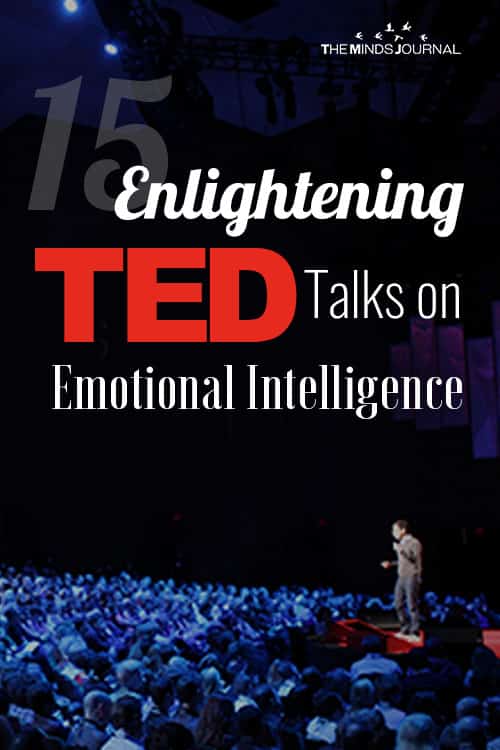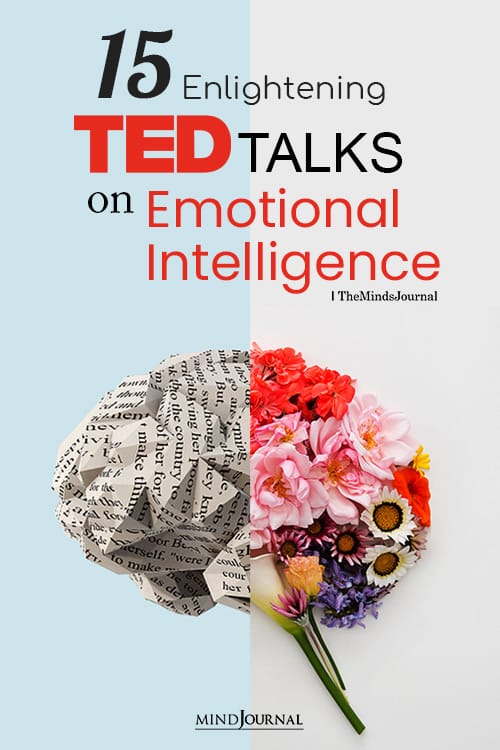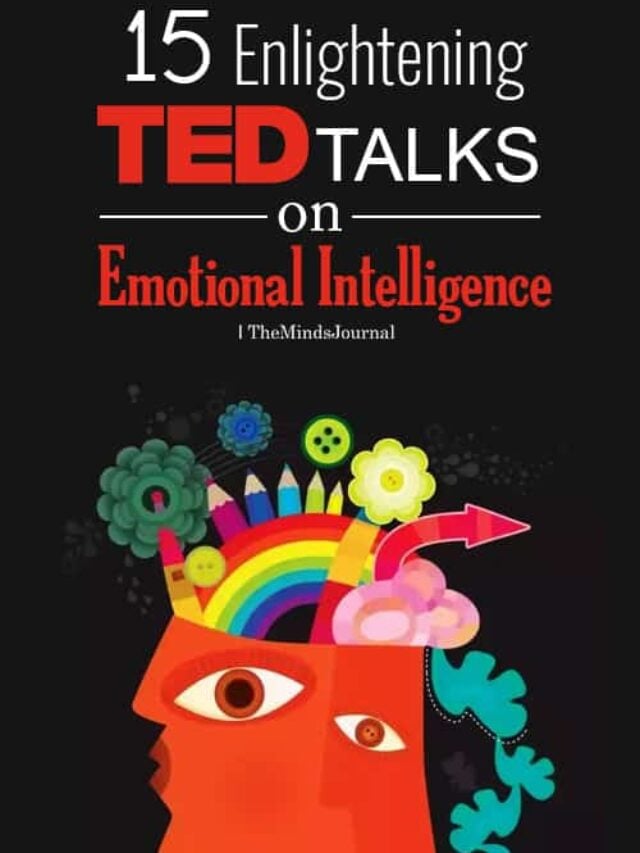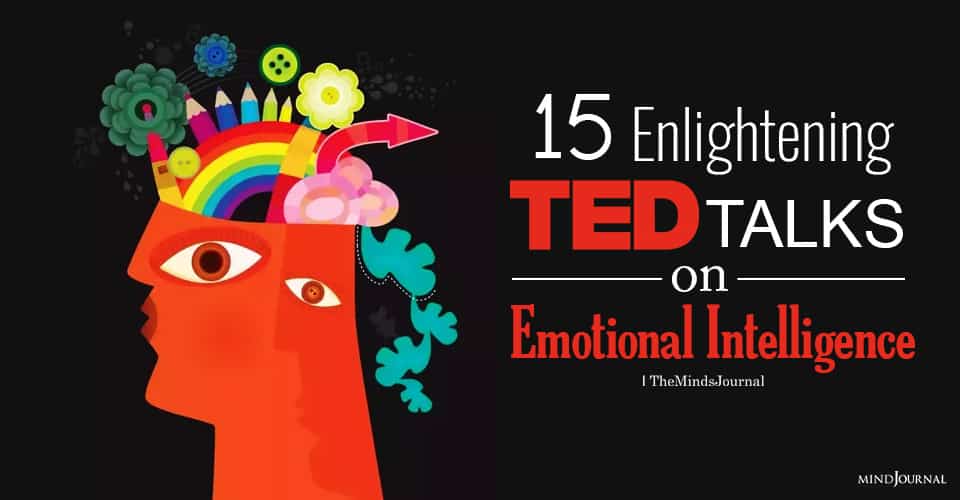Ever since their launch in 1984, TED Talks have offered the world inspirational, informational, and influential speeches. These talks have been given by people from different walks of life on subjects ranging from education and business to creativity and culture.
Emotional Intelligence is one of the many topics that have been talked about and it goes to show how crucial it is in this day and age for leaders of all backgrounds to master this trait.
“As more and more artificial intelligence is entering into the world, more and more emotional intelligence must enter into leadership.” ― Amit Ray
Emotional intelligence is the ability to understand and manage your own emotions, and those of the people around you. People with a high degree of emotional intelligence know what they’re feeling, what their emotions mean, and how these emotions can affect other people.
Emotional intelligence is generally said to include at least three skills:
1. Emotional awareness, or the ability to identify and name one’s own emotions;
2. The ability to harness those emotions and apply them to tasks like thinking and problem solving;
3. And the ability to manage emotions, which includes both regulating one’s own emotions when necessary and helping others to do the same.
Read How to Release Painful Emotions Trapped in Your Body
Here are 15 Enlightening TED Talks on Emotional Intelligence:
TED Talk 1. Connection Through Compassion | Daniel Goleman
Author of the book Emotional Intelligence, Daniel Goleman talks on the topic of compassion in his 2007 Ted Talk. He mentions the spectrum from self-absorption to compassionate altruism that exists and is exhibited in one’s behavior.
His message on how an empathetic response to others and how it changes their reaction to them is indeed very eye-opening. He came to understand through his ‘awakening’ into ‘the human moment’ that people are so caught up in this ‘urban trance’ of all the hustle and bustle of modern life that it has left everyone with less compassion and consideration for one another. He states that there is no correlation between IQ and emotional empathy.
Dr. Goleman reminds us that compassionate decisions can be made on a daily basis. He emphasizes the need for compassionate decisions and the positive changes it is capable of making in our world. Compassion is a strong factor of emotional intelligence we can apply in order to lead and understand people because when compassion leads, change is made.
Check out the video here: Connection Through Compassion
TED Talk 2. The Art of Managing Emotions | Daniel Goleman
In this TED Talk, Daniel Goleman speaks on how we can build emotional intelligence in a workplace environment. He mentions the need for leaders to use strategies to enable a state of flow among co-workers in order to enhance productivity within the workplace. The role of a leader is taking responsibility in the emotional landscape of a company and the intentional use of mirror neurons from the social brain is explained in his speech.
The following points state the ways through which leaders can support their workers to reach a state of flow:
- Setting clear goals and having flexibility in their attainment.
- Giving immediate feedback on how progress toward the set goals are made.
- Challenging and growing skill-sets in workers.
- Matching workers’ ability with required tasks, to improve engagement.
Learn more about Daniel Goleman and his studies on emotional intelligence on his official website.
Check out the video here: The Art of Managing Emotions
TED Talk 3. You Aren’t at the Mercy of Your Emotions – Your Brain Creates Them | Lisa Feldman Barett
This talk by Lisa Feldman Barrett is based on neuroscience research conducted by her and her colleagues. Great insight into the architecture of the experience of human emotions was given to the neuro-scientists and psychologists by the meta-analysis of emotions research (Lindquist et al. 2012).
Barrett sheds light upon the empowering nature of the science of emotions. She explains that the brain constructs predictions as a way of reacting to physical experiences. This implies that emotions are mere guesses or predictions that are most similar to other life experiences. These experiences are developed through time but human beings are born with a physical barometer for basic sensations like calm, agitation, and comfort vs. discomfort.
She explains how it is everyone’s responsibility to understand our emotional behavior since it is not universally experienced. It is our responsibility to improve our emotional landscape when we misbehave.
Check out the video here: You Aren’t at the Mercy of Your Emotions – Your Brain Creates Them
Read 3 Lesser Known Facts About Emotional Intelligence
TED Talk 4. How to practice Emotional Hygiene | Dr. Guy Winch
Dr. Guy Winch talks about the importance of intentional practices to maintain emotional hygiene. Just as one’s physical self is susceptible to injuries that can cause much pain, so is the psychological self. These injuries may include failure, rejection, and loneliness. It is everyone’s responsibility to practice emotional hygiene in order to counter psychological damage to stop emotional bleeding.
The fact that loneliness and other such psychological injuries increase mortality rates should encourage us to practice good emotional hygiene. Dr. Winch suggests that by creating an emotional first aid kit, people can improve their overall well-being by overriding their negative emotions. We go through a lot of emotional injuries, some that we’ve become so used to that we are simply unaware of.
For emotional injuries like these, we must apply the right Band-Aid from our emotional first aid kit and maintain sensible emotional hygiene.
Practicing emotional hygiene is just as important as brushing your teeth. It must be practiced on a daily basis to overcome habits like rumination and negative self-talk. For the all-around well-being of a person, maintaining good emotional hygiene is an essential part of our everyday lives in order to strengthen one’s emotional intelligence.
Check out the video here: How to practice Emotional Hygiene.
TED Talk 5. Emotional Mastery: The Gifted Wisdom of Unpleasant Feelings | Dr. Joan Rosenberg
Dr. Joan Rosenberg discusses the science of emotions and the impact of ‘gut punches’ on our capabilities in life. She says that if we can experience and move through eight unpleasant feelings, we can do anything we want in life. Her formula she calls the ‘Rosenberg Reset’ is a method that everyone must apply in their daily lives. It improves self-confidence by responding to unpleasant feelings with intention, patience, and choice which can shift one’s emotional well-being in a day.
The Rosenberg Reset
1 choice – 8 unpleasant feelings – 90 seconds .
The choice is to stay present in the unpleasant situation, instead of trying to numb or push the emotion aside.
The 8 unpleasant feelings are sadness, shame, helplessness, anger, vulnerability, embarrassment, disappointment, and frustration.
The 90 seconds is the time frame within which it takes neuro-chemicals to “rush and flush” as a physical experience in the body.
Instead of framing these undesirable feelings in the category of ‘bad’ or ‘negative’, a subtle change in the title to unpleasant can re-frame the whole experience as navigable and temporary. Rather than treating these emotions as a fragile and breakable experience, we can change them to empowered patience. The formula is like the granted resilience that is attained after an inoculating shot.
Check out the video here: Emotional Mastery: The Gifted Wisdom of Unpleasant Feelings
TED Talk 6. The Power of Emotional Intelligence | Travis Bradberry
In this TED Talk, Travis Bradberry speaks on the importance of developing emotional intelligence. He explains the nature of emotions and how they affect and work in the brain. He discusses the difference between Emotional Quotient (E.Q) and Intelligence Quotient (IQ) along with the difference between E.Q and personality.
Bradberry mentions the three ‘silver bullets’ for enhancing Emotional Intelligence. His strategy of countering stress with an attitude of gratitude is explored. He stresses the importance of maintaining a good sleep schedule in order to boost Emotional Intelligence and the importance of reducing caffeine intake.
Check out the video here: The Power of Emotional Intelligence
Read 4 Quadrants Of Emotional Intelligence And What They Mean
TED Talk 7. 6 Steps to Improve Your Emotional Intelligence | Ramona Hacker
Ramona Hacker provides us six steps to improve our emotional intelligence in this Ted Talk. She reflects on how she overcame a major emotional burnout for herself. The six steps to improve emotional intelligence according to her are as follows:
1.Build awareness to a level of unconscious competence.
2. Differentiate and analyze emotions.
3.Accept and appreciate emotions as signals.
4. Reflect and find the origin.
5. Handle the emotions.
6.Then handle the emotions of others.
Check out the video here: 6 Steps to Improve Your Emotional Intelligence
TED Talk 8. How We’ve Been Misled by Emotional Intelligence | Kris Girrell
Author of A Married Man’s Survival Guide and Executive leadership coach – Kris Girrell discusses highly intelligent scientists and emotional intelligence in this TED Talk. He talks about a survey he conducted with a room full of highly intelligent individuals, or ‘a group of Sheldons’ as he frames it.
He mentions how leadership is not necessarily connected with high intelligence. His idea of the periodic table of emotions is also a fantastic perspective on the topic of emotional intelligence.
He discusses how ‘the dark night of the soul’ brought about humanity’s sudden awareness of emotion as a surprising yet frightening experience. Girrell shares his personal battle with despair for all of us to reflect on. He takes us through a very deep insight into the emotional experience and the significance of emotional intelligence in leadership.
His e-book A Guide to the Periodic Table of Emotions is available on Amazon.
Check out the video here: How We’ve Been Misled by Emotional Intelligence
TED Talk 9. The Light and Dark side of Emotional Intelligence | Alison Bacon
Alison Bacon gives an interestingly informative speech on emotional intelligence and the two ways in which it can be utilized – a more positive and constructive way or a negative and manipulative way. She talks about a study at Plymouth University in the UK, where they used virtual reality to test behavior and emotional intelligence.
She stresses building emotional intelligence among all people. The reason being that there are people out there and among us, that tend to use emotional intelligence as a tool in manipulating people to meet their own ends. Having a high level of emotional intelligence can help to counter, deal and manage the behavior of such individuals. Studies have shown that narcissists and psychopaths tend to have a high sense of emotional intelligence.
Check out the video here: The Light and Dark side of Emotional Intelligence
Read 16 Signs Of Low Emotional Intelligence
TED Talk 10. The Gift and Power of Emotional Courage | Susan David
Susan David delivers an inspirational talk on emotional agility and the power of emotional courage. She paints a vivid picture of her emotional intelligence through her personal story of grief and loss, and her radical acceptance of difficult and unpleasant emotions.
She mentions that the accuracy with which people name their emotions and how they deal with it is essential for mining those emotions for data and aligning them with their personal values. So, instead of saying, “I am angry,” replace it with, “I’m noticing that I’m feeling angry.” In aligning values and actions, separating oneself from the emotions to use emotions as data is essential.
Susan David is the author of Emotional Agility: Get Unstuck, Embrace Change, and Thrive in Work and Life. Her award-winning emotional intelligence book, based on 20 years of research in emotions, helps people in building emotional agility and understanding that emotional intelligence is essential to a successful life.
Check out the video here: The Gift and Power of Emotional Courage
TED Talk 11. The Three Secrets of Resilient People | Lucy Hone
Lucy Hone shares her compelling personal story of overcoming extreme adversity by using the skills in emotional intelligence she had learned through her 10-year research in resilience. Her message empowers and urges the need for emotional intelligence to be a part of our everyday lives.
After having worked with the US Army on mental resilience training, it is apparent that this speaker is a soldier herself.
The three secrets of resilient people that she mentions are as follows:
1. Realization of suffering as a part of life. Understanding and accepting hard times can be tough but it all comes down to how we choose to handle it. We can either wallow in the pain or take the opportunity to heal, learn and live through it with resilience.
2. Selective attention to what is changeable and what is not. This is not a means to diminish the pain. Instead, it is a practice to approach the situation with good intentions. It is looking for social support in hard times. It is gathering the benefits in any situation.
3. Is what I’m doing helping or harming me?’ It is everyone’s responsibility to be mindful in one’s behavior in times of suffering and to keep in mind that what we choose is the only thing that will help us come out of it or at least handle it. Emotional intelligence is understanding this awareness is vital for growth.
Check out the video here: The Three Secrets of Resilient People
TED Talk 12. The Importance of Raising an Emotionally Intelligent Child | Erika Brodnock
Erika Brodnock, founder and owner of Karisma Kidz, shares her vulnerable story on mental health and how it sparked the idea of starting up a program for children. Karisma Kidz is a program for kids to overcome their difficulties using play and positivity.
She stresses the importance of positive affirmation and reinforcement for children in a digestible manner. The seeds that are planted in the minds of these young ones are certain to bear great fruit in their adulthood. Erika Brodnock wants to see these children grow to live with less stress and practice positive affirmation throughout their life.
Check out the video here: The Importance of Raising an Emotionally Intelligent Child
TED Talk 13. Emotional Intelligence From a Teenage Perspective | Maximilian Park
Maximillian Park speaks on the topic of the need for emotional intelligence among teenagers in school. He stresses on the need for the skills provided by a level of E.Q to be present in the environment of a classroom.
He mentions that he put in much personal effort to raise his level of E.Q, and encourages us to imagine a school curriculum in which these skills were actually built. According to Daniel Goleman in his book A Force For Good, this is the dream of the Dalai Lama. The generations to come could live in a more emotionally and environmentally conscious world where compassion and empathy are practiced everyday.
Parents and teachers becoming more aware of the skills in positive psychology that are available to assist in raising kids with emotional intelligence is an aspiration being sought after by The Center of Positive Education.
Check out the video here: Emotional Intelligence From a Teenage Perspective
Read 12 Self Care Practices That Can Boost Your Emotional Intelligence
TED Talk 14. The People Currency: Practicing Emotional Intelligence | Jason Bridges
Jason Bridges shares his personal story of how he built his E.Q after a traumatic brain injury. He came to understand through his struggle that the relationships he built with the people around him were a vital part of building success.
A key element of Bridges’ different businesses is that he applied and made his employees aware of the skills of emotional intelligence.
He encourages us to start out small with something as simple yet powerful as a smile to initiate building levels of emotional intelligence. Smiling offers and lets others smile as well which increases the EQ tremendously. This practice builds social awareness, self-awareness, empathy, and relationships.
“Be interested, not interesting,” is a motto that Bridges teaches and uses for those seeking a higher level of EQ.
Check out the video here: The People Currency: Practicing Emotional Intelligence
TED Talk 15. Emotional Intelligence: Using the Laws of Attraction | Dr. D. Ivan Young
Dr. D. Ivan Young delivers a talk on the value of your connection to your subconscious mind. By putting in effort and improving presence at the moment-to-moment meaning, your manifestation of desires can be realized.
Aligning thoughts with desired values need a deeper understanding of your emotions, which will be followed by action that will ultimately change the course of your life. What you desire to be present in your life are all subconsciously attracted through your thoughts, emotions, and actions. This means that you can change your life with the power of mindful presence.
Check out the video here: Emotional Intelligence: Using the Laws of Attraction
Which one of the TED Talks were your favorite, and you resonated with the most? Let us know your thoughts in the comments down below!












Leave a Reply